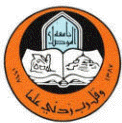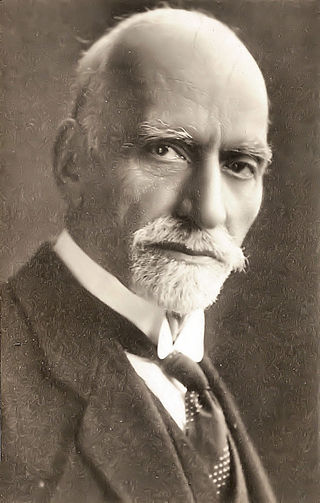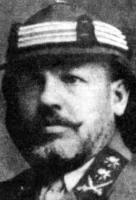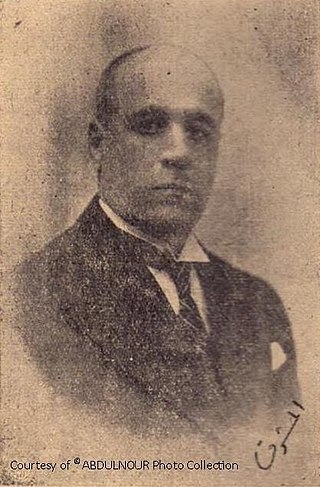Related Research Articles

Faisal I bin Al-Hussein bin Ali Al-Hashemi was King of the Arab Kingdom of Syria or Greater Syria in 1920,and was King of Iraq from 23 August 1921 until his death. He was the third son of Hussein bin Ali,the Grand Emir and Sharif of Mecca,who was proclaimed as King of the Arabs in June 1916.

Abdul Muḥsin al-Sa‘dun,KCMG was an Iraqi politician who served as the prime minister of Iraq on four occasions between 1922 and 1929.

Yasin al-Hashimi,born Yasin Hilmi Salman,was an Iraqi politician who twice served as the prime minister. Like many of Iraq's early leaders,al-Hashimi served as a military officer during Ottoman control of the country. He made his political debut under the government of his predecessor,Jafar al-Askari,and replaced him as prime minister shortly after,in August 1924. Al-Hashimi served for ten months before he was replaced,in turn by Abd al-Muhsin as-Sa'dun. Over the next ten years he filled a variety of governmental positions finally returning to the office of prime minister in March 1935. On 30 October 1936,Hashimi became the first Iraqi prime minister to be deposed in a coup,which was led by General Bakr Sidqi and a coalition of ethnic minorities. Unlike al-Askari,who was then his minister of defense,al-Hashimi survived the coup and made his way to Beirut,Lebanon,where he died three months later. His older brother and close ally,Taha al-Hashimi,served as Prime Minister of Iraq in 1941.

Nuri Pasha al-Said CH was an Iraqi politician during the British mandate in Iraq and the Hashemite Kingdom of Iraq. He held various key cabinet positions and served eight terms as the prime minister of Iraq.

Jamil Al Midfai was an Iraqi politician. He served as the country's prime minister on five separate occasions.

Gertrude Margaret Lowthian Bell,CBE was an English writer,traveller,political officer,administrator,and archaeologist. She spent much of her life exploring and mapping the Middle East,and became highly influential to British imperial policy-making as an Arabist due to her knowledge and contacts built up through extensive travels. During her lifetime,she was highly esteemed and trusted by British officials such as High Commissioner for Mesopotamia Percy Cox,giving her great influence. She participated in both the 1919 Paris Peace Conference (briefly) and the 1921 Cairo Conference,which helped decide the territorial boundaries and governments of the post-War Middle East as part of the partition of the Ottoman Empire. Bell believed that the momentum of Arab nationalism was unstoppable,and that the British government should ally with nationalists rather than stand against them. Along with T. E. Lawrence,she advocated for independent Arab states in the Middle East following the collapse of the Ottoman Empire,and supported the installation of Hashemite monarchies in what is today Jordan and Iraq.
This is a survey of the postage stamps and postal history of Iraq. It includes special uses under the Ottoman Empire as well as occupation issues.

The Kingdom of Iraq under British Administration,or Mandatory Iraq,was created in 1921,following the 1920 Iraqi Revolt against the proposed British Mandate of Mesopotamia,and enacted via the 1922 Anglo-Iraqi Treaty and a 1924 undertaking by the United Kingdom to the League of Nations to fulfil the role as Mandatory Power.

Arshad Pasha al-Umari was an Iraqi statesman from the ancient al-Omari family.

The Hashemite Kingdom of Iraq was a state located in the Middle East from 1932 to 1958.

The University of Mosul is a public university located in Mosul. It is one of the largest educational and research centers in the Middle East,and the second largest in Iraq,behind the University of Baghdad.

Sir Sassoon Eskell,KBE was an Iraqi statesman,financier and politician. Also known as Sassoon Effendi,he was regarded in Iraq as the Father of Parliament. Sir Sassoon was the first Minister of Finance in the Kingdom and a permanent Member of Parliament until his death. Along with Gertrude Bell and T. E. Lawrence,he was instrumental in the creation and the establishment of the Kingdom of Iraq post Ottoman rule,and he founded the nascent Iraqi government's laws and financial structure.

The Anglo-Iraqi Treaty of October 1922 was an agreement signed between the British and Iraqi governments. The treaty was designed to allow for Iraqi self-government while giving the British control of Iraq's foreign policy. It was intended to conclude an agreement made at the Cairo Conference of 1921 to establish a Hashemite Kingdom in Iraq.

Ali Rida Pasha al-Rikabi was the First Prime Minister in modern Syria and was also the 3rd Prime Minister of Jordan.
Mulla Abu Bakr Effendi,also Mulla Effendi,also Abu Bakr IV or Küçük Mulla was a senior Kurdish-Iraqi Muslim Scholar,Islamic philosopher,scholar,astronomer,politician,and a prominent Iraqi personality from Arbil,Iraq.
Hanna Petros,was an Iraqi Chaldean composer and a scholar. He wrote numerous books and treatises on oriental music,Iraqi Maqams and Syriac hymnody. He also established a renowned conservatory in Baghdad.
Yousef Rizq Alah Ghanima was an Iraqi politician,journalist and historian. He represented Christians at the time of Kingdom of Iraq,after which he was appointed to the Ministry of Finance six times,and the Ministry of Supply once. He is known for founding Seda Babel,one of the first newspapers in Iraq in 1908. He wrote many books about the history of Iraq.
Sayyid Hashim Al-Witry M.D. was an Iraqi physician and author born in Baghdad. He was one of the founders of the Royal College of Medicine of Iraq in which he worked in as a professor and dean. He was a key contributor to the establishment of the Iraq Academy,of which he was vice president then president for two periods (1938) and. He was an elected member of the Iraqi Academy of Science and a second Vice President to the academy. He also re-established the House of Wisdom "Bayt Al-Hikma,Scientific institution intellectual" and was its president from 1953 to 1958.

Abdulahad Abdulaziz AbdulNour was an Iraqi physician,politician,and humanitarian. He served as a medical doctor in Mosul before World War I,during the war with the Ottoman Army,and he founded the Royal Hospital of Erbil. He also served in Mosul and various Iraqi cities in public and private medical positions after the war,until he died in 1948. He was elected twice to the Council of Representatives of Iraq to represent the Christians of Mosul during the monarchy rule.

Thabit Abdulaziz AbdulNour was an Iraqi politician,a government administrator,and a diplomat. He was elected twice to the Council of Representatives of Iraq to represent the Christians of Mosul during the monarchy's rule. He served as the first director of oil in the Iraqi government,and as a diplomat in London,Great Britain,Jeddah,Saudi Arabia,and Sanaa,Yemen.
References
- ↑ The Chaldean Catholic Church: Modern History, Ecclesiology and Church-State by Kristian Girling
- ↑ Christianity in Iraq: Its Origins and Development to the Present Day to Suha Rassam (2005) P 155
- ↑ الدكتور حنا بهنام خياط أول وزير صحة عراقي من مسيحيو العراق Algaqrdenia magazine article by badri noel yosef
- ↑ الكلية الطبية الملكية العراقية: من خلال سيرة ذاتية, المجلد 1 from Salem Damluji